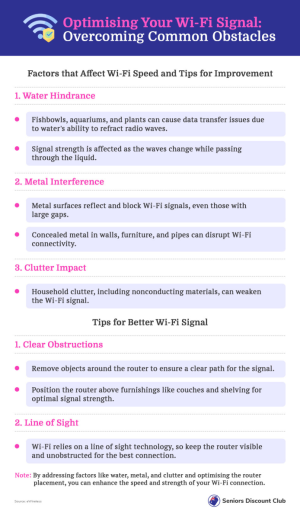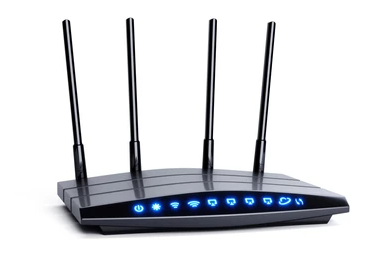Is your Wi-Fi slow? These unsuspecting household items could be the culprits!
By
- Replies 3
Are you frustrated with your lagging Wi-Fi speeds? We're sure you've muttered a few choice words under your breath when trying to stream a movie or video call your family, only to find that your Wi-Fi is crawling at a snail's pace.
Most of us blame the internet provider or router for poor Wi-Fi speeds, but did you know that some common household items could hinder your connection?
According to eWireless founder Henry Kurkowski, author of the book Remote Work Technology, certain household items can absorb, refract, or reflect Wi-Fi signals, ultimately leading to slower speeds and spotty connections.
One major culprit might surprise you – the unassuming fishbowl sitting in your living room.
Why is that? It's because water is an electrical conductor, and radio waves can’t pass through it, unlike other materials, such as wood, bricks, and cement.
Wi-Fi uses these radio waves to send high-speed data through the air over short distances to your various devices.
'If you have an aquarium, a fishbowl, or even plants between your workspace and the wireless routers, you will have some data issues,' explains Kurkowski.
'It sounds surprising, but the water will refract the radio waves and can cause lower data transfer rates as the signal changes moving through the liquid.'
Another material that can severely impact your Wi-Fi connectivity is metal.
'Metal reflects and blocks Wi-Fi signals entirely,' warns Kurkowski.
Metal shelves, furniture, and objects with large gaps, like wire racks or grills, will 'have a scattering effect' on the radio waves, leading to weak or dropped signals.
Sometimes, metal is hidden within the construction of our homes. Old plaster walls reinforced with chicken wire, metal poles in concrete, and pipes distributing water throughout the house can interfere with your Wi-Fi signal.
Kurkowski advises that even non-conducting materials like everyday household clutter can weaken and slow your Wi-Fi connection.
So, how can you improve your Wi-Fi speeds without undergoing a major household declutter or renovation?
The eWireless founder has a simple but effective tip: ‘Every time the signal has to go through a wall or a piece of furniture to reach your laptop, the signal becomes weaker.’
‘If your Wi-Fi router is surrounded by clutter or tucked behind a flat-screen TV, your signal will be far from optimal.’
‘Clear away objects from around the router and get it up to a level where it sits above furnishings such as couches and shelving.’
‘Wi-Fi is a line-of-sight technology. If you can see the router, you will have the best connection.’


So, members, if you're tired of your slow Wi-Fi, try a quick spot of decluttering, adjusting the position of your router, or simply moving that lovely fishbowl across the room.
You might be pleasantly surprised by better Wi-Fi speeds and stronger connections.
Do you have any tips for how to boost your Wi-Fi speed? Share them in the comments below.
Speaking of Wi-Fi, do you know you could be at risk when connecting to airport Wi-Fi? Read more about it here.
Most of us blame the internet provider or router for poor Wi-Fi speeds, but did you know that some common household items could hinder your connection?
According to eWireless founder Henry Kurkowski, author of the book Remote Work Technology, certain household items can absorb, refract, or reflect Wi-Fi signals, ultimately leading to slower speeds and spotty connections.
One major culprit might surprise you – the unassuming fishbowl sitting in your living room.
Why is that? It's because water is an electrical conductor, and radio waves can’t pass through it, unlike other materials, such as wood, bricks, and cement.
Wi-Fi uses these radio waves to send high-speed data through the air over short distances to your various devices.
'If you have an aquarium, a fishbowl, or even plants between your workspace and the wireless routers, you will have some data issues,' explains Kurkowski.
'It sounds surprising, but the water will refract the radio waves and can cause lower data transfer rates as the signal changes moving through the liquid.'
Another material that can severely impact your Wi-Fi connectivity is metal.
'Metal reflects and blocks Wi-Fi signals entirely,' warns Kurkowski.
Metal shelves, furniture, and objects with large gaps, like wire racks or grills, will 'have a scattering effect' on the radio waves, leading to weak or dropped signals.
Sometimes, metal is hidden within the construction of our homes. Old plaster walls reinforced with chicken wire, metal poles in concrete, and pipes distributing water throughout the house can interfere with your Wi-Fi signal.
Kurkowski advises that even non-conducting materials like everyday household clutter can weaken and slow your Wi-Fi connection.
So, how can you improve your Wi-Fi speeds without undergoing a major household declutter or renovation?
The eWireless founder has a simple but effective tip: ‘Every time the signal has to go through a wall or a piece of furniture to reach your laptop, the signal becomes weaker.’
‘If your Wi-Fi router is surrounded by clutter or tucked behind a flat-screen TV, your signal will be far from optimal.’
‘Clear away objects from around the router and get it up to a level where it sits above furnishings such as couches and shelving.’
‘Wi-Fi is a line-of-sight technology. If you can see the router, you will have the best connection.’

A summary of the reminders that Henry Kurkowski shared for boosting the speed of the Wi-Fi. Credit: Seniors Discount Club.
Key Takeaways
- Common household items, such as fishbowls and metal objects, can hinder Wi-Fi speed and connection.
- Water, metal, and clutter can negatively impact Wi-Fi signals as they refract or block radio waves.
- Concealed metal (e.g., chicken wire, metal poles, and water pipes) can also interfere with Wi-Fi signals.
- To improve the Wi-Fi connection, keep the router free from clutter and position it above surrounding furniture, as the technology works best with a clear line of sight.
So, members, if you're tired of your slow Wi-Fi, try a quick spot of decluttering, adjusting the position of your router, or simply moving that lovely fishbowl across the room.
You might be pleasantly surprised by better Wi-Fi speeds and stronger connections.
Do you have any tips for how to boost your Wi-Fi speed? Share them in the comments below.
Speaking of Wi-Fi, do you know you could be at risk when connecting to airport Wi-Fi? Read more about it here.








